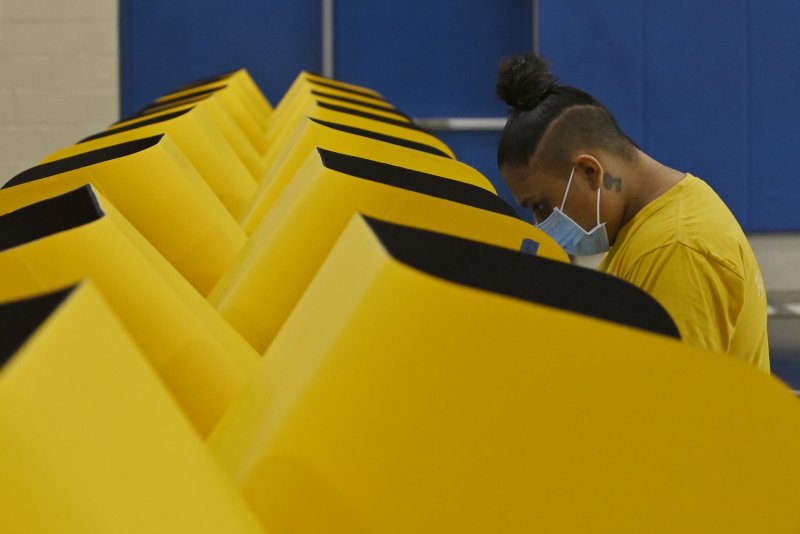1 of 11 | A woman casts her ballot in California's gubernatorial recall election at the Bellevue Recreation Center in Los Angeles on Tuesday. Photo by Jim Ruymen/UPI |
License Photo
Sept. 14 (UPI) -- California Gov. Gavin Newsom was projected to defeat a vote to recall him from office as votes rolled in Tuesday night.
With more than 60% of the votes tallied the "no" vote was leading 68% to 32% and CNN and CBS projected that Newsom would remain in office.
"Now, let's get back to work," Newsom tweeted late Tuesday.
In a short speech following the election, Newsom said he didn't want to focus on what the public said no to but to what they embraced by rejecting the recall effort.
"We said yes to science. We said yes to vaccines. We said yes to ending this pandemic. We said yes to people's right to vote without fear of fake, fraud of voter suppression," he said, "We said yes to women's fundamental constitutional right to decide for herself what she does with her body, her fate and her future. We said yes to diversity.
"We said yes to all those things we hold dear as Californians and I would argue as Americans," he said.
Newsom, a Democrat and former mayor of San Francisco, has faced multiple Republican-led recall attempts, but this is the only one to meet the requirements of state law and reach the ballot.
The recall was initiated by a petition more than a year ago that accused Newsom of endorsing laws that "favor foreign nationals, in our country illegally, over that of our own citizens." It also criticized Newsom for the state's high taxes, its homeless crisis, his support for "sanctuary city" immigration laws and other progressive policies.
More than 1.7 million Californians signed the petition, eclipsing the 1.49 million signatures needed to trigger an official recall. The number of people who signed the petition is equal to about 12% of the votes cast when Newsom was elected governor in 2018.
![]()
Vice President
Kamala Harris speaks in support of California Gov. Gavin Newsom in San Leandro, Calif., last Wednesday. A former U.S. senator from California, Harris urged voters to defeat the Republican-led recall. Photo by Terry Schmitt/UPI
Ballots were mailed to all 22 million registered voters in the state about a month before Election Day. The ballot asks voters to answer two questions -- first, if Newsom should be recalled, and second, who should succeed him as governor.
If a majority vote "no" on the first question, Newsom will remain governor. If 50% plus one vote "yes," then he would be ousted as governor and the candidate who receives the most votes on the second question would serve the remainder of Newsom's term, until January 2023.
A total of 46 candidates qualified to be on the ballot -- 24 Republicans, 10 with no party affiliation, nine Democrats, two from the Green Party and one Libertarian.
One of the top GOP candidates was conservative talk radio host Larry Elder.
Elder, 69, has pledged to undo the state's COVID-19 vaccine and mask mandates -- and his campaign on Monday started making claims of election fraud as polls showed Newsom was likely to beat the recall effort, similar to former President Donald Trump's claims last fall after he lost to Democrat Joe Biden.
![]()
Wearing a
Ronald Reagan shirt, conservative actor
Scott Baio speaks in support of Republican candidate Larry Elder during a rally in Thousand Oaks, Calif., on September 6 and urges voters to vote "yes" on recalling Gov. Gavin Newsom. Baio was also a vocal supporter of former President Donald Trump. Photo by Jim Ruymen/UPI
Trump, who often clashed with Newsom when he was president, last week told right-wing news outlet Newsmax that he believes the recall election is "probably rigged."
Biden traveled to California on Monday to survey wildfire damage and to campaign for Newsom. At a stop in Long Beach, Biden cautioned Californians not to allow the Republican-led maneuver, or Trump's influence, to take hold in the state.
"You can either keep Gavin Newsom as your governor, or you'll get Donald Trump," he said.
As for the other candidates on the ballot Tuesday -- far behind Elder at the top of the field were fellow Republicans John Cox, the GOP nominee and loser of the 2018 gubernatorial race, former San Diego Mayor Kevin Faulconer and Democrat Kevin Paffrath, a 29-year-old YouTube star.
![]()
Supporters of Republican recall candidate Larry Elder gather for a rally in Thousand Oaks, Calif., on September 6. Elder is a conservative talk radio host with rhetoric that echoes former President Donald Trump. Photo by Jim Ruymen/UPI
Since 1911, California law has allowed state voters to attempt to recall the governor. In fact, every governor in the past 60 years has faced a recall attempt. Newsom has faced seven, but this is the first to reach the ballot.
Aside from the election Tuesday, only one other attempt achieved enough signatures to trigger a recall vote -- a 2003 effort that ultimately recalled Democratic Gov. Gray Davis and elected action star and moderate Republican Arnold Schwarzenegger. The actor, who was a fiscal conservative and a social liberal, was later elected to a second term and served until 2011.
California is a heavily Democratic state and hasn't voted for a Republican president since George H.W. Bush in 1988. Aside from Schwarzenegger, the state elected two GOP governors during the latter half of the 1980s and most of the 1990s.
Since 1913, there have been 179 recall attempts of state elected officials in California. Eleven collected enough signatures to qualify for the ballot, and six of those resulted in the official being recalled. There have been 55 efforts to recall the governor. The last successful recall of a state official occurred in 2018, when state Sen. Josh Newman was removed from office.


















